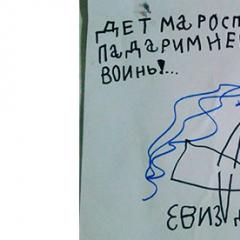2. All about successors in Russian language. Different parts of the language in the role of adopters
The main folding among the victorious adopters of the Russian field is among the great number of wines. However, in the first place, the varto was discussed in the main principle - which of the citations to win in this or that word.
As we are talking about material objects, such as steel, a wardrobe, a refrigerator, a box, a chest of drawers, then the receiver "On" means embossing on the surface of the object (burn), and "B" - the middle of the object.
For example:
Put your clothes by the chest of drawers.
Put your clothes on the chest of drawers.
Put the assistant on the table.
Lay the assistant at the table.
Navit with objects that do not have clear boundaries, such as grass, you can most often beat both the “B” receiver and the “On” receiver.
For example:
We ruled a picnic on the grass.
A rabbit hid by the grass.
Also, as one object is clearly ruffled on the surface of the other, we win the successor of "Na".
Respect! Behind the logic of the move, on top of it, we’ll open it, we won’t fringe the beast. Tse varto remember, shards such a look at speech helps to understand the logic and the culture of the language, which develops the language from a distance.
For example:
on the street
on the bridge
on the birch
on teeth
on the square
on the balcony
at the stadium
to the market
on style
on the sofa
on the table
on a plate
on the mountain
on the islands
And also the receiver "On" wins, if we are talking about the sides of the world:
At pivdnі, pivnochі, come in, go out.
Whom rules have low blame. Axis of action from them:
We vikoristovuєmo "B", if we are talking about water (maєmo on uvazi perebuvannya near the water):
Fish are swimming near the river.
We swim in the lake.
So "B" is written with the word armchair, like going about a person, like sitting at someone else's. І зі word hand.
I love to sit by the armchair.
Malyukov put a spoon in his hands.
Receiver "B" wins, if we are talking about an object that is located in the boundaries of another object. Tobto another can be seen chimos close, like a box. Abo can read the boundaries.
For example:
in the apartment
to the booth
in the country
near the park
by the garden
Vinyatki:
in the fatherland
at the station
in stock
at the factory
at the factory
on top
As we are talking not about material objects, but about things, then most often the victorious apprentice "Na".
For example:
at the lesson
at the opera
at exhibitions
We can say "in the opera", but also the word "opera" to move from the category of subdivision to the category of life with її walls and dahom. Tobto tse is significant "in the life of an opera"
Vinyatki:
on the road
at the train station
in dorozi
at the exit
at the wind farm
to the cinema
We can’t guess within the framework of this article absolutely all the blame related to the living of the recipients, so you can be told and others, as it is necessary to remember.
Good day, shanovny student! Today, I would like to add respect to such a clumsy topic that calls out difficulties in foreigners, like successors. The Russians have a lot of adopters and skins from newcomers to enter the same group. Receivers are needed for us to connect the words with the river, to show on the song, the hour, the space, the reason for the chi.
Today, we can look at the receivers, as we live with food "de", "kudi", "stars"
With the power word "de" in the Russian language, 2 successors "on" and "in" are being used, how can it be resolved if one of these successors is being used? Sound seemingly about the space, which may be on the outside, which is necessary in a new one, in the middle, we live "in", as we are talking about the space and may be on the edge, it's wide, wide, on the surface, don't sound close, then live "on ", let's take a look at the butts:
De vie practice? I work at the grand office Where do you work? I work in a big office
De vie live? We live in a small apartment Where do you live? We live in a small flat/appartment
De buv concert? Vіn proishov at the great stadium near Moscow Where was the concert? It has been held in a big stadium
Where are children playing? Stinks roar on the Maidanchika bіla booth Where the children play? The stench is playing on hryvnias near the booth.
In these butts, the words "apartment" and "office" are closed spaces, so we live in my apprentice "in". And the words "stadion" and "maydanchik" are heard by the mists, on the surface of which people spend that hour and sound not so long ago, to which we live it is brought "on".
From the food "kudi" we also live in the receivers "in" or "on", but in to this particular type the name-bearer, who, after the successor, is guilty of standing at the wise man, for example:
Where are you going this evening with Anton? We are going to drink at the new cafe Where are you going tonight with Anton? We are going to visit a new cafe.
Where did grandma go? Vaughn pishla nadvir Where is granny? She went to the street
In these butts, the same principle of "closed" or "open" to the open space, but still with the word "de" after the receiver, the name of the receiver of the receiver, then in the case of the nurse, "kudi", we live the names of the knowing leader:
Went to the street (in Accusative case)
In a new cafe (in Accusative case)
At the sound of the power of the "stars", in the Russian language, sound the receivers "z" and "s" live
In order to correctly understand which of these leads to live, remember the following rule:
We are talking about straight ahead: where are you going? I gave you a live receiver "in", then the word "stars" means a direct turn: go / turn the stars? Clearly, in promotional duties, use the receiver "z":
Where did she go? U Samara Where did she go? She went to Samara
Did the stars come out? Z Samari [Atkuda ana priekhala? Iz Samary] Where did she come from? view Samara
Remember that schematically and butt looks like this: "in" - "z"
How about food: where are you going? If you have a present receiver "on", then you will use the word "stars": Stars of the stars? We are guilty of vikoristati receiver "s". For example:
Kudi vin pishov so early? Win a job Where did he go so early? He went to work
Are the stars of the wines coming so pizno? Z roboti Where did he come so late? From work.
Schematically, qi butts can be shown like this: "on" - "from"
Remember the words with which the receiver "z" gets used:
From study room
From the restaurant
From the theater
From the city
Words that get used to "with":
From work
From the North
From the square
Remember that the word "stadion" with the receiver "s" and the power word "stars" does not get used, the letter "o" is added to the receiver:
Sounds to go people? Zі stadium Wh ere did this people come? Type of stage.
Receiver- This is the service part of the mov, as it shows the staleness of names, numbers and borrowers in the form of other words in phrases and words.
Absolutely, just like the completion of independent words, the apprentices serve to connect words with word-findings and words.
Aiming the butt: Go to the toilet, blanch s | iz | banks, go outside.
Receivers do not change, like other service parts of the mov.
Receivers enter the warehouse of the members of the council, but not the members of the council.
We aim an example:
Approximately the next day, the car turned off the road and went for the place.
Receivers are divided into categories about the meaning.
The stench is booming:
open space - show on the plate;
causal - indicate the cause;
tsіl'ovі - point to the tsіl;
to the way dії - point to the image of dії;
dodatkovі - indicate on the subject, on which the action is directed;
nepokhіdnі - not approved from the other parts of the movie;
pokhіdnі - utvorenі z іnshih parts promo.
Let's talk about skin detail:
space:
For example: from-for, on, s, to, over, y, in, for, pіd, z-pіd, to, navkolo, povz, mizh, navkolo, before, through, across, middle, against, bіlya, bіlya, close, vzdovzh, posture, in the middle, krіz and іnshі.
Aim the butt: bіlya booth, near the booth, hit the booth, behind the booth, in front of the booth, behind the horn.
timchasovo:
For example: through, on, before, ahead of time, in, with, stretching and others.
Let's aim a butt: at Mondays, ahead of sleep, until the day, from Monday, through tidzhen, two years, stretching the last day.
causal:
For example: zavdyaki, by, for, in, through, through, afterward and others.
Let's aim a butt: in the face of hunger, through the ailment, through the ailment, through the ailment, zavdyaki zavzyatnosti, after the ailment.
whole:
For example: on, for, for, for, for, for that іnshі.
Let's aim a butt: for the sake of satisfaction, for the night, for mushrooms, for the benefit of the Fatherland, for mushrooms.
way of doing:
For example: in, on, s, without that іnshі.
Let's aim a butt: without fear, out of suffocation, speak to the soul.
dodatkovі:
For example: by, shodo, about, about, s, that іnshi.
Let's aim a butt: about a friend, about a mother, with a friend, about a dad, a friend.
For trips, the recipients are divided into two groups:
not good(Not approved of the other parts of the movie);
For example: for, through, at, in, on, from, before, over, under, before that іnshі.
get away(Adopted from other parts of the movie):
Z prislіvnikіv - navko, belya, in the middle, navko, across, ahead of the day, zgіdno;
For example: standing for a bіlya budinka - a receiver, standing for a bіlya - an attendant;
Z іmennikіv - protyazh, vnaslіdok;
For example: with a stretch of the godini - a receiver, with a stretch of a river - a name with a receiver;
Z dієprislіvnikіv - zavdyaki, unrespectful.
For example: without respect for that - a successor, do not wonder in my bik - a priest.
Receivers can get accustomed to one or more forms.
For example, the receiver is supposedly getting used to only with a distant notice (with a mandate, with a decree), the receiver through - only with a rodovim vіdminkom(through the kuta, through the twig); the successor can victorate with the successor's opinion and the famous opinion
For example: at school - before school.
Receiver- This is the service part of the mov, which reflects the staleness of names, numbers and borrowers in the form of other words in phrases and phrases: I'm going before uncle, I'm going per milk, go on three.
Morphological signs of adopters
Receivers say words in phrases and phrases: go in shop, log out h shop, go per hut.
To successors, like others serving parts of us move, do not change with authority.
Receivers themselves are not members of the speech, but enter to their warehouse (required at once from independent words): Mi zіyshli h roads.
See the recipients
Behind the receiver's warehouse, you can subdivide into three main groups:
1) Forgive the receivers (the warehouse has only one word with one root): u, navkolo, over, zavdyaki.
2) Warehouse receivers (before the warehouse of such receivers enter two words and more): irrespective of, on vіdmіnu vіd, on prodovzhennya.
3) Foldable receivers (replace two roots, write them with a hyphen): z-for, z-pіd, over.
For travel, two groups of recipients are divided:
1) Nepokhіdnі (do not svіvvіdnosya for the illumination of some part of the movie): in, before, o, s, y, for, vіd and others. Before bad drives lie and folding: z-for, z-pіd, over.
2) Pokhіdnі prijmenniki for their adventures pov'yazanі with other parts of the movie: nazustrіch, nachebto, shodo, not respectful.
Receivers, made from other parts of the movie, are:
1) Betrothed (genetically related to successors): near, in front, in the middle, behind ta іn Such immutable words like in near, near, near and similar vikoristovuyutsya, zokrema, and independently (without linking with im'yam), tobto. can lie up to the prislіvniki. Along with names, these words become drives: Vin continued walking navkolo So close (History) - It was already known to be pizno, close opivnochі(Receiver).
2) Vіdіmennі priymennі є result of the transition іmennіv to priymennіv. Most often, there are many names with successors before them: vnaslіdok, stretching, prodovzhennya, on kshtalt, shdo, by virtue of ta in Apply: Lastly like a hustle, we had a chance to check on the offensive trolleybus. In the sale in all winters Skvortsov two or three times a day saw us.
3) Vіddієslіvnі priymennі without intermediary pov'yazanі z dієєprіvlіvnі: no matter what, no matter what, zavdyaki, turning on, turning off, fixing (s), through ta in Example: On the sea, irrespective of fog, you can be merry with miraculous landscapes.
Together from the article “What is the result of the Russian?” read:



